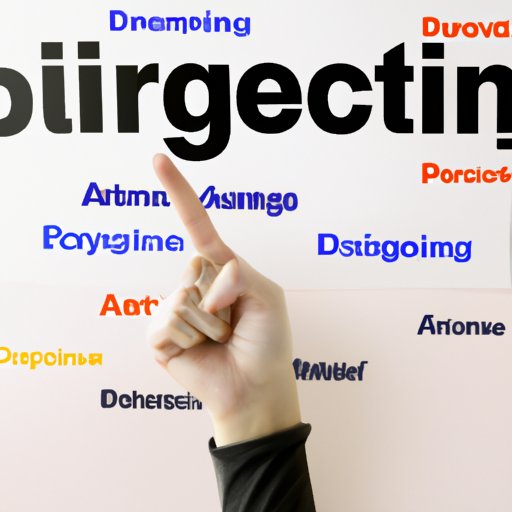Introduction
Annoyance is a normal emotion that most people experience at some point in their lives. It can arise when someone or something irritates or frustrates you, and it can range from mild irritation to extreme anger. The good news is that there are ways to manage your annoyance in a healthy way.

Identify the Source of Your Annoyance
The first step in managing your annoyance is to identify what is causing it. Ask yourself questions such as: “What am I feeling right now?”, “What triggered this reaction?”, and “Why do I feel this way?” This will help you to understand why you are feeling annoyed and what is causing the emotion.
Once you have identified the source of your annoyance, focus on the behavior that is causing it. Consider whether it is something that you can change or if it is something that the other person needs to address. This will help you to determine how to best move forward.

Talk to the Person Directly
If you feel comfortable doing so, talking to the person who is causing your annoyance can be an effective way to address the issue. When expressing your feelings, try to remain respectful and avoid attacking the other person. Take responsibility for your own emotions, and explain how their behavior is making you feel.
Be sure to listen to the other person’s perspective and try to find common ground. This can be difficult, but it is important to remember that each person has their own set of experiences and beliefs that shape their behavior.
Set Boundaries and Communicate Them Clearly
Setting boundaries is another important step in managing your annoyance. Think about what you are and are not willing to accept from the other person, and communicate these boundaries clearly. Be firm in enforcing them, and remind the other person if necessary.
It is also important to remember that boundaries can change over time. If you find that your boundaries are no longer working, take the time to reevaluate them and make adjustments as needed.
Practice Self-Care and Relaxation Techniques
Taking care of yourself is essential when it comes to managing your annoyance. Make sure to take time for yourself and do activities that help you relax, such as meditation, yoga, reading, or listening to music. If you find that your emotions are becoming too overwhelming, seek professional help.
Develop Positive Coping Strategies
Finding ways to distract yourself from negative thoughts can also be helpful. Focus on activities that bring you joy, such as spending time with friends and family, going for a walk, or trying something new. Challenging unhelpful beliefs can also be beneficial.
Develop Empathy for the Other Person
Understanding the other person’s perspective can be difficult, but it can be beneficial in managing your annoyance. Try to look for common ground between you and the other person, and consider their feelings and motivations. This can help you to gain a better understanding of the situation and develop empathy for the other person.

Take a Break From the Situation if Necessary
Sometimes it can be beneficial to take a break from the situation in order to give yourself time to process your emotions. Make sure you have a support system in place during this time, such as friends and family who can provide emotional support.
Conclusion
In conclusion, learning how to stop being annoyed by someone can be a challenging but worthwhile process. Identifying the source of your annoyance, setting boundaries, practicing self-care, and developing empathy are all important steps in managing your emotions. Taking a break from the situation may also be beneficial if needed. With practice and patience, you can learn to manage your annoyance in a healthy way.
(Note: Is this article not meeting your expectations? Do you have knowledge or insights to share? Unlock new opportunities and expand your reach by joining our authors team. Click Registration to join us and share your expertise with our readers.)
